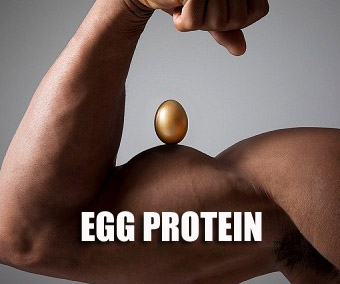


Refers to the group of dry egg products.
Similar names: dry egg protein, dry egg albumin, egg protein.
Dry egg protein is a 100% natural product. It is obtained by drying fresh chicken eggs. Only healthy, clean and dry eggs that meet European requirements are used for the production. Eggs are broken mechanically and the egg whites are removed from the yolks. The separated albumin is filtered and pasteurized at 63 ° C for 3.5 minutes, cooled to 4 ° C and dried at 190 ° C.
Dry egg protein has many areas of application. In some, they come across a different name. For example, the food industry is known as dry egg white, in the wine industry - dry egg albumin. When used as a food supplement for sportsmen, dry egg protein is known as Egg Protein.
Egg protein has a superior amino acid profile. Its composition includes optimal ratios of all essential amino acids. Not by chance, egg protein has been chosen as a gold standard. It is fully absorbed by the human organism. It falls into the group of slow-release proteins. Provides building material for muscle growth. Due to the minimum carbohydrate content and lack of fat it is suitable for different types of protein diets.
A single egg that breaks weighing about 50 grams consists of approximately 33 grams of protein and 17 grams of yolk. To obtain one kilogram of dried egg protein, about 9 kg of liquid proteins are needed, equivalent to about 273 proteins. Eggs. From the egg white of 33 grams, about 3.1-3.2 grams of dry egg protein are produced.
The daily intake is different but does not exceed 1- 2 grams per kilogram of body weight divided into 2-3 intakes. For example, 60 - 90 g daily intake divided into 2 - 3 doses of 30 g (one tablespoon is about 15 g).
The disadvantages of egg protein are its characteristic taste and poor dissolution. These disadvantages are not seen in combination with dairy products, natural juices or other proteins. It can also be used to make high protein foods such as pancakes, soups, desserts.
| Dry albumin | Eggs (whites) |
|---|---|
| 1 kg. | 273 ct. |
| 100 g. | 27 ct. |
| 30 g. | 8 ct. |
| 15 g. | 4 ct. |
| 10 g. | 2.7 ct. |
| Energy | Protein, g. | Fats, g. | from which saturated, g. | Carbohydr., g. | from which sugars, g. | Salt, g. | Sodium (Na), mg. | Fibers, g. | |
|---|---|---|---|---|---|---|---|---|---|
| kcal | kJ | ||||||||
| 382 | 1595 | 81 | 0 | 0 | 8 | 5 | 0 | 1280 | 0 |
The egg protein consists of five different proteins, which are divided into simple - (ovalbumin 75%, ovalbalbumin 3%, ovalbumin 2%) and complex or glycoproteins - (ovomucoid 13%, ovomucin 7%). Proteins of the dry albumin also include the proteins lysozyme and avidin. Egg proteins have found the presence of 18 in 20 amino acids found so far. No additives and sweeteners.
| Amino acids in the egg white ,%:calculated from 16% nitrogen |
Mineral substances: mg | Microelements: | Vitamins: mg/g |
|---|---|---|---|
| Alanine - 8,3% | Phosphorus - 6,0 mg | Bohr - 0,04 mg | Zinc - 0,07 mg |
| Arginine - 15,2% | Calcium - 4,0 mg | Cuprum - 0,02 mg | Riboflavine - 4,52 mg/g |
| Aspartic acid - 7,1% | Magnesium - 3,0 mg | Флуор - 0,01 mg | Niacin - 0,96 mg/g |
| Glutamic acid - 15,7% | Chlor - 51,0 mg | Fluorine - 0,002 mg | Pantothenic acid - 13 mg/g |
| Glycine - 2,0% | Potassium - 55,0 mg | Molybdenum - 0,004 mg | Biotine - 0,05 mg/g |
| Histidine - 5,7% | Sulfur - 64,0 mg | Titane - 0,0028 mg | Folic acid - 0,47 mg/g |
| Leucine - 12,5% | Iron - 0,3 mg | Vitamine B6 - 0,01 mg/g | |
| Lysine - 17,2% | Sodium - 53.0 mg | ||
| Methionine - 5% | |||
| Phenylalanine - 5,2% | |||
| Proline - 4,8% | |||
| Serine - 1,2% | |||
| Threonine - 3,5% | |||
| Tryptophan - 11,6% | |||
| Tyrosine - 13,4% | |||
| Valine - 5,5% |